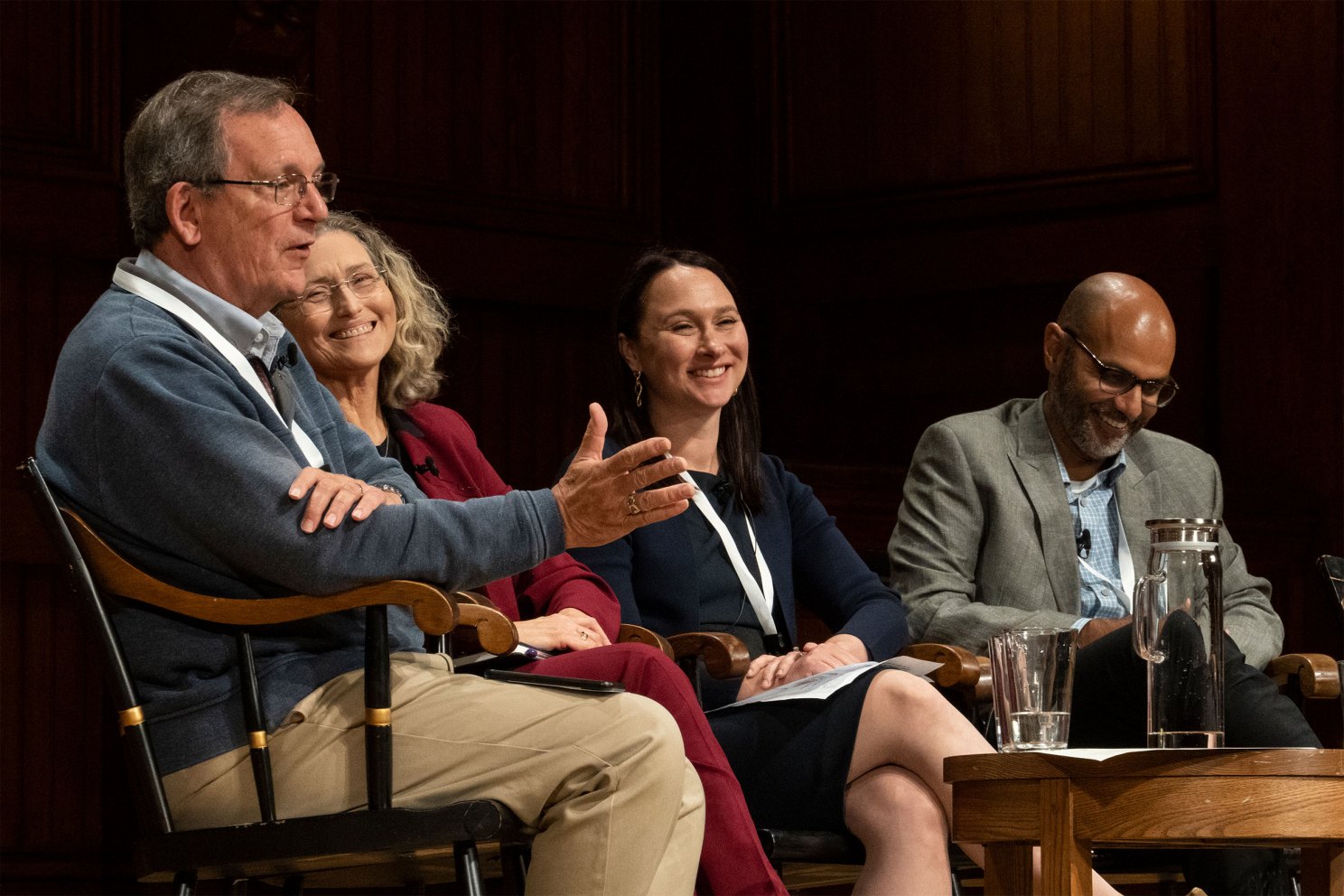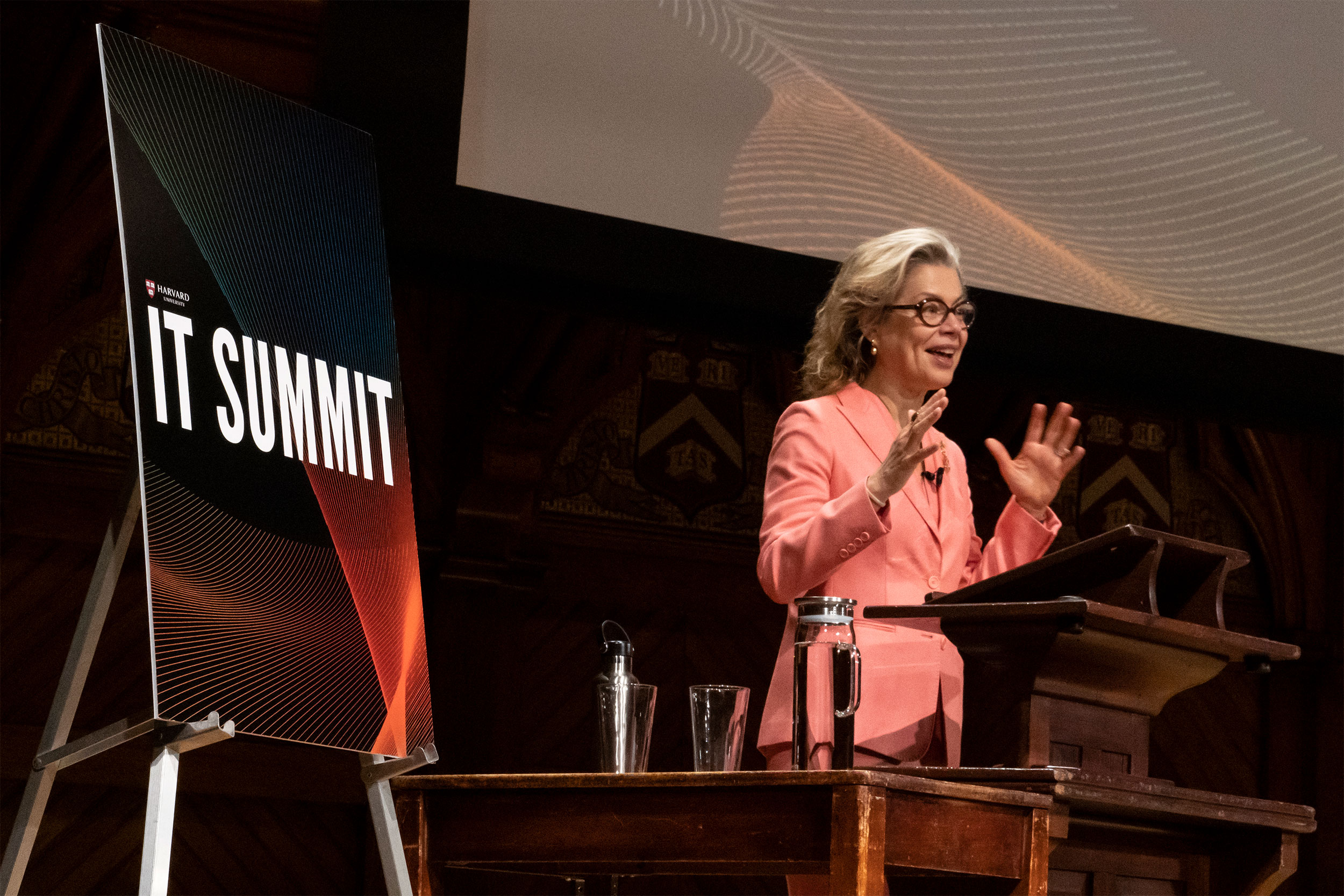IT summit looks to build better future with tech

Harvard CIO / CTO panel at the 10th Annual Harvard University IT Summit (from left) Jim Waldo (SEAS), Deborah Corwin Scott (HMS), Erica Bradshaw (HUIT) and Pratike Patel (HLS). Neal Adolph Akatsuka/Harvard IT
More than 700 Harvard IT staff and community members gathered in Sanders Theatre on Tuesday, June 6, for the tenth anniversary IT Summit, hosted by the University’s CIO Council.
The event — the first since 2019 following a pandemic-enforced hiatus — was introduced by Meredith L. Weenick, executive vice president, and Klara Jelinkova, vice president and university chief information officer. Weenick paid tribute to the efforts of IT staff who “enabled the University’s academic and administrative work to continue” throughout the pandemic and hailed the audience as “idea generators and agents of change” who will guide Harvard through an era of rapid technological evolution. Jelinkova added that the IT community’s “spirit of creativity, innovation, and thought leadership” during Covid inspired the Summit’s theme and prior day’s virtual “Hackathon,” in which more than 300 staff across campus participated in developing new technologies, ideas, and solutions.

AI’s impact on higher education was a recurring topic throughout the day and the focus of an opening session featuring industry panelists. CDW’s Christopher Marcolis characterized AI as “an efficiency,” useful for handling mundane tasks like managing email inboxes and generating or editing draft reports or initial code to create more time for meaningful work. LogicMonitor’s Ryan Worobel described AI as an “augmentation tool” as opposed to a replacement for the essential “human touch” in higher education. All panelists urged caution around how AI tools obtain and use data, with Marcolis warning that “when you submit content [to a generative AI tool] it becomes public knowledge.” VMWare’s Herb Thompson also discussed the need for universities to follow and respond to the quickly evolving legislative landscape. But there was general enthusiasm about the potential of AI in higher education, notably in making fields such as data science more accessible to a broader range of learners.
A panel of Harvard CIOs and CTOs delved further into the topic. Jim Waldo, Gordon McKay professor of the Practice of Computer Science and chief technology officer for the John A. Paulson School of Engineering and Applied Sciences (SEAS), described the pandemic as having a larger effect on the way that faculty teach than anything else in his 30 years of teaching, adding that he expects AI will have a similarly transformative impact. Deborah Corwin Scott, chief information officer for Harvard Medical School, described the potential for AI tools to process massive amounts of data generated by researchers and hospital clinicians, but emphasized the importance of responsible data use. University Chief Technology Officer Erica Bradshaw concurred, urging the audience to “think about what it means to be a good data steward.” Waldo expressed confidence that Harvard has “a combination of talents … unmatched anywhere in the world” to think through questions of data privacy and ethical use.
The rapid pace of technological change means “there’s no new normal anymore,” according to an afternoon panel on creating a culture of innovation. Deloitte’s Peter Fritz noted that the pandemic triggered a wave of innovation within higher education, “but it was disaster response rather than being planful … Now that universities feel like they [have stabilized], the need to modernize the digital experience has become clearer.” To foster creativity, Harvard Business School’s Donna Tremonte urged leaders and managers to create inclusive and supportive environments in which IT staff feel empowered to share ideas and innovate.
In the event’s closing keynote presentation, James H. Stock, vice provost for Climate and Sustainability, Harold Hitchings Burbank professor of Political Economy, and director of the Salata Institute, spoke of the climate crisis as “an opportunity to bring Harvard’s resources to bear,” emphasizing the necessity of collaboration across Schools and disciplines. Stock encouraged the audience to contribute to this spirit of collaboration by working together across traditional administrative boundaries to find solutions.




